I never even knew such words as these:
“Let someone else do it.”
In some parts of the country, it’s already begun. In others, it’s still a week away, after we get past the Labor Day holiday. I’m talking about “back to school” time. As teachers and professors wrap up their preparations for a new semester and classrooms and lecture halls begin to fill up with students covering the full spectrum between eagerness and apathy, Education is the topic at hand. So for this week’s column, I’ve chosen a film on that theme… kind of. It focuses not so much on either the students or their teachers, but an administrator given the task of running the whole operation.
It’s Wings, from Eclipse Series 11: Lariso Shepitko, a set named after the Russian woman who directed the two films contained therein. Prior to watching Wings, I had no familiarity at all with Shepitko’s work (and just a bit of experience with Russian cinema in general, having seen a few of the more famous titles by Eisenstein and Tarkovsky and nothing else.) I mainly knew of this set as “the cheap one,” the least expensive Eclipse box on the market, and the slimmest, holding just two films on two discs – though it represents nearly half of Shepitko’s output in feature-length films, due to her too-young death in a car accident in 1979.
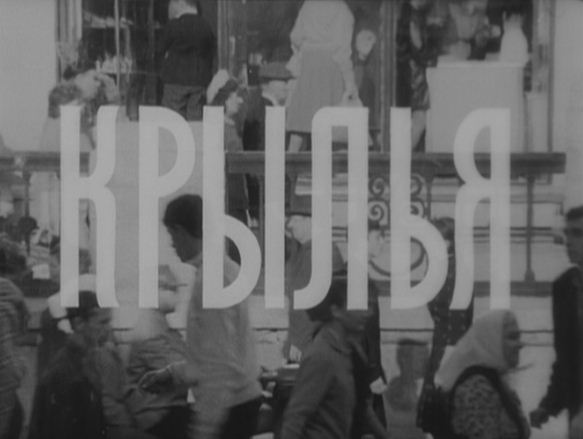
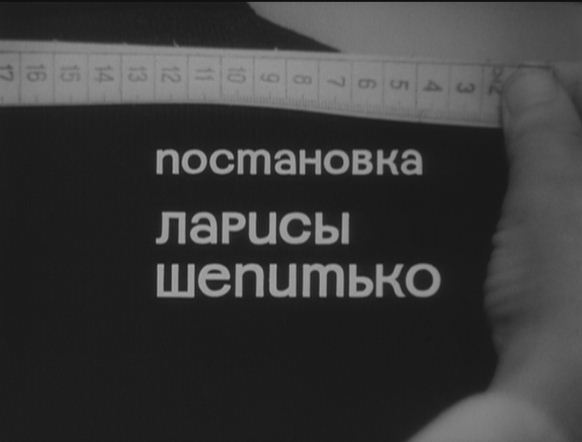
Wings was her debut feature, released in 1966 when she was 28 years old. It’s a remarkably assured work, telling its story on her own terms, maintaining an ambivalent, observational tone, patiently allowing the narrative arc to build as we gradually settle in to a knowledge of what makes its protagonist tick. A retired fighter pilot (from the Great Patriotic War, as Russians refer to World War II) is now struggling through middle-of-life doldrums, stuck in the confines of a school superintendent’s job. Despite the popular acclaim and heroic status of past wartime accomplishments, something seems to be missing. The pilot-turned-administrator struggles to find something that will add a new spark to daily routines and silently harbors anxieties that the glories of the past will never find their equivalent in whatever the future may hold.
A plot with that outline seems conventional enough, territory that’s been explored in a fair number of “midlife crisis” films – but the fact that this story involves a female fighter pilot-turned-schoolmaster and takes place in the USSR is just the starting point for what makes Wings a memorable and affecting cinematic experience. Filmed during a period of relative openness within the Soviet film industry, Wings offers mild but subtle critiques of the conditions of that place and time – plumbing that doesn’t work, cheap concrete that crumbles under the impact of stiletto heels, the plodding pace of building renovations and so on – as well as a clear demonstration of the artistic talent that was cultivated and nurtured within that system.

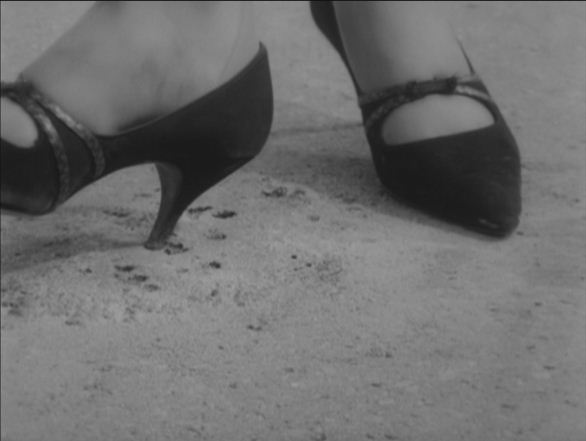
Nadhezda Petrukhina (who I will refer to afterward as Nadya, to save myself some typing) is now in her early 40s, unmarried and generally respected in her community. I don’t think we ever get a clear indication of what Russian city she works in, but she’s clearly been given a fairly comfortable, slightly preferential post within the Soviet bureaucracy on account of her past service to the nation. We first see her after a terrific multi-layered opening shot of a crowd of people walking to and fro in front of what turns out to be a tailor shop window. She’s getting measured for a suit she’ll wear to deliver a televised speech accepting an honorary diploma on behalf of the construction-oriented trade school she runs.
After making her presentation, she’s abruptly put on the spot when two of her students misbehave badly right in front of her as she’s surrounded by the same dignitaries who just bestowed the award. Feeling the pressure a bit, she overplays her hand with a sullen rebellious young man, who mocks her threat of expulsion if he refuses to apologize to the girl with whom he started the disturbance. The awkward exchange doesn’t end real well, but the deeper damage comes from how swiftly a small incident like that drains away the feeling of satisfaction that positive public recognition is intended to provide.

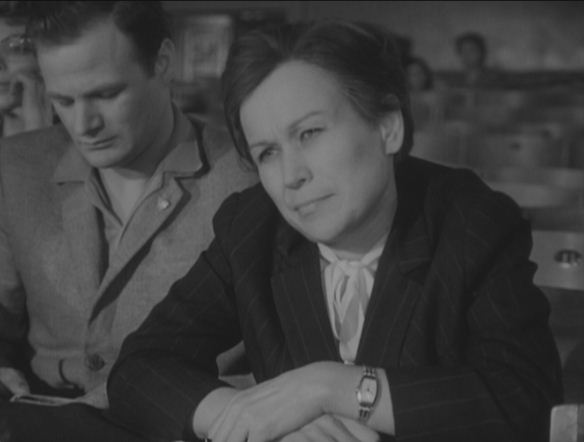
As Wings progresses, numerous small-scale but aggravating setbacks occur, each one chipping away at Nadya’s resolve to look on the bright side of her work, but describing them here serves little point. They are just the typical kinds of hassles that anyone working in a long-term career position faces, whether the field is education or any other kind of job involving large systems that rely on the cooperation of fickle, unreliable human beings.
As a social services worker myself for 20+ years, I could easily relate to the minor dilemmas Nadya had to sort through: the repetition of tedious tasks, coaxing reluctant and emotional students and colleagues to stick to and complete their assignments, the struggle to come up with the right wording in public communications, and so on. Shepitko did a fine job keeping the on-the-job irritations believable and interesting, without feeling the need to amp up the melodrama or inject artificially contrived crises into the mix. Her aim is naturalistic realism of a sort that commercially-driven Hollywood films have rarely been able to achieve, as they typically resort to things like terminal illness, family-shattering affairs or the threat of homicidal violence to stir audience emotions.

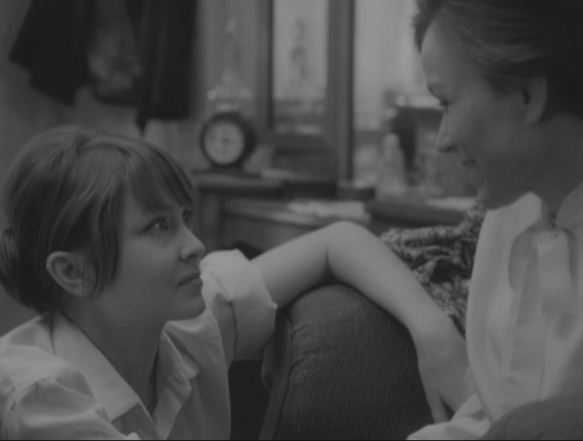
Alongside Nadya’s professional frustrations, she also has to deal with more personal and domestic transitions. Her adopted daughter Tanya (who still thinks Nadya is her natural mother) has recently married Igor, a man some 15 years older than her. Nadya and Igor have never met, nor has any invitation been extended, though Nadya takes it upon herself to drop in unannounced one afternoon.
It’s yet another awkward encounter, though a few humorous moments and Nadya’s mental resourcefulness manage to lighten the mood a bit, in Tanya and Igor’s apartment, surrounded by their friends, and in other circumstances as well. As we get to know Nadya, we begin to realize what a determined and efficient hard-worker she is and always has been up to this point in her life.


That inner toughness and competitive drive to succeed is crystallized in the scene that produced the quote at the top of the article, spoken by Nadya after Tanya encourages her to quit her school job and “let somebody else take care of the brats.” Nadya’s endless willingness to shoulder the load of social responsibility, such a prized characteristic in Soviet society (and so many others, of course) is precisely now the cause of her own internal discontent.
As the film nears its conclusion, we see Nadya begin to experiment with spontaneity: an impromptu dance in an empty cafe with a newfound friend… allowing herself to be drenched in the rain with a handful of produce rather than running to shelter like everyone else… a startling proposal to a male companion who never thought he’d have to respond to such a query from her. But is shirking that ethos of adherence to the social order and carrying one’s share of the load a real solution? Or is it merely giving in to weakness and expecting someone else to compensate for one’s failure to handle the pressure?
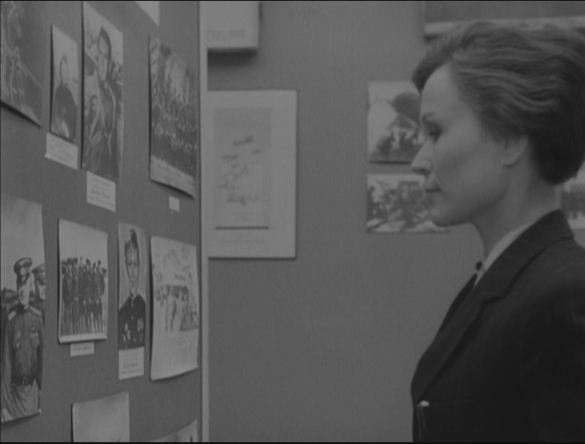

These questions are never explicitly framed in Wings– they arise only from my own contemplation of Nadya’s character and the parallels I see between her life and my own. While on vacation earlier this month, I had the opportunity to revisit for the first time in 20+ years some places where some of my most crucial life events had taken place, so I could relate in a way to the scene, late in the film, where Nadya visits the local museum exhibit that detailed her wartime exploits. Seeing the old photos again triggered in Nadya a release of her underlying tensions in recalling past experiences she had flying for the Soviet Air Force, memories conveyed to us via visual flashbacks – first of amorphous cloudscapes, later of old conversations with Mitya, a fellow pilot and former lover, and finally of the critical flying mission that made her a hero and established the trajectory of her life afterward and up until the point we see her in the film.
Wings concludes on a wondrous but tantalizingly ambiguous note, as Nadya’s journey reaches its culmination in a way that exhilarates those viewers who’ve successfully climbed on board, but leaves up to us the ultimate interpretation of where she winds up going after “The End” flashes across the screen.


At the risk of giving the wrong impression, here’s a video I found on YouTube that uses clips from Wings with a contemporary Russian pop song. Let me be clear: You won’t hear this music on the DVD! I found an excerpt from Wings too, but it’s a spoiler and I think you’re better advised to see it for the first time in the context of the movie itself.






![Bergman Island (The Criterion Collection) [Blu-ray]](https://criterioncast.com/wp-content/uploads/2022/11/bergman-island-the-criterion-collection-blu-ray-400x496.jpg)
![This Is Not a Burial, It’s a Resurrection (The Criterion Collection) [Blu-ray]](https://criterioncast.com/wp-content/uploads/2022/11/this-is-not-a-burial-its-a-resurrection-the-criterion-collection-blu-ray-400x496.jpg)
![Lars von Trier's Europe Trilogy (The Criterion Collection) [The Element of Crime/Epidemic/Europa] [Blu-ray]](https://criterioncast.com/wp-content/uploads/2022/11/lars-von-triers-europe-trilogy-the-criterion-collection-the-element-of-400x496.jpg)
![Imitation of Life (The Criterion Collection) [Blu-ray]](https://criterioncast.com/wp-content/uploads/2022/11/imitation-of-life-the-criterion-collection-blu-ray-400x496.jpg)
![The Adventures of Baron Munchausen (The Criterion Collection) [4K UHD]](https://criterioncast.com/wp-content/uploads/2022/11/the-adventures-of-baron-munchausen-the-criterion-collection-4k-uhd-400x496.jpg)
![Cooley High [Criterion Collection] [Blu-ray] [1975]](https://criterioncast.com/wp-content/uploads/2022/11/cooley-high-criterion-collection-blu-ray-1975-400x496.jpg)